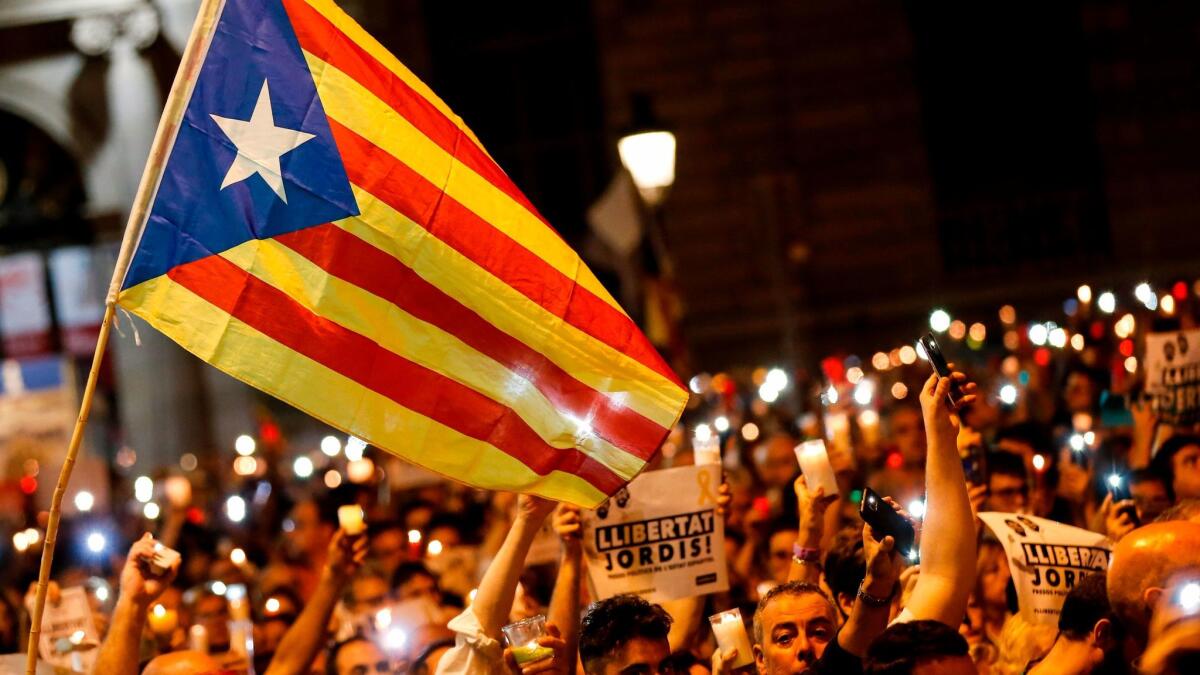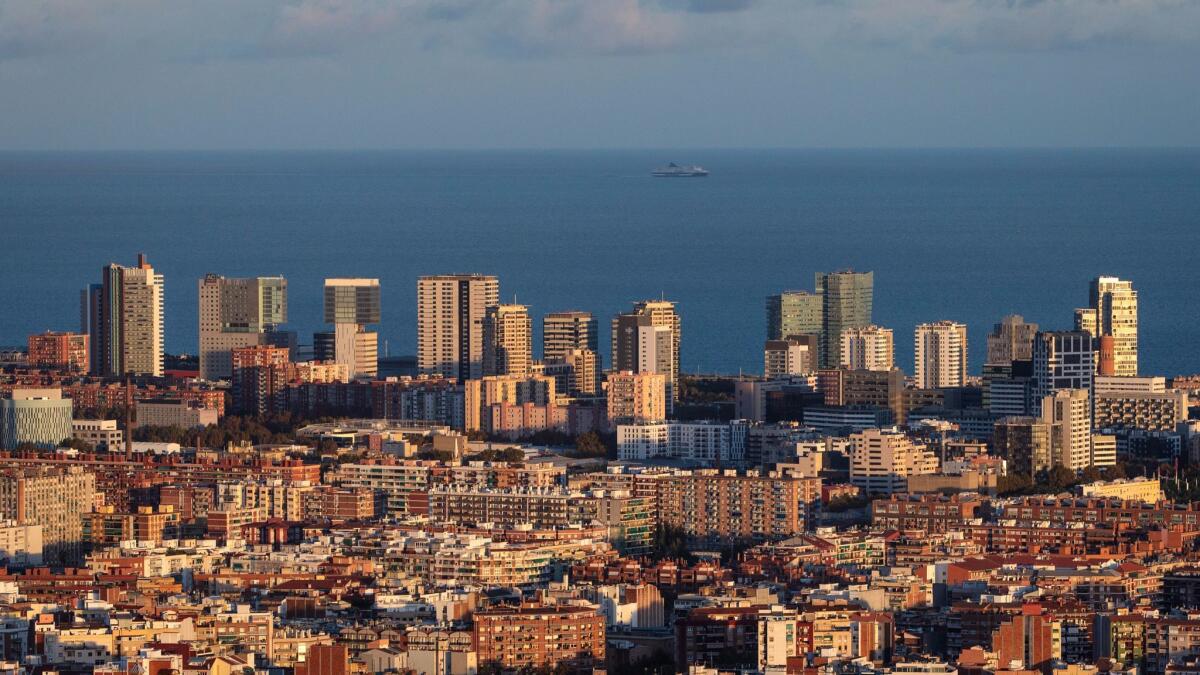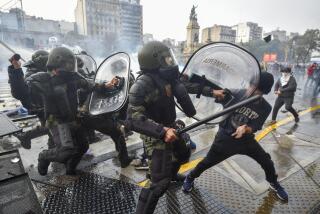Catalonia takes a breather — but this week could bring its independence bid to a boil

- Share via
Reporting from Barcelona — In Barcelona’s medieval Gothic Quarter, the enormous crowds of demonstrators who thronged the narrow streets a day earlier had vanished, supplanted by cafe-goers and tourists and shoppers. It might have been any languid Sunday in one of Europe’s most charming cities, with friends sitting in a neighborhood bar talking politics.
But that would be leaving aside the scrawled notes affixed to police barricades, the wary-looking guards in front of City Hall and the seat of the regional Catalan government, the single-starred regional flags fluttering from metal balcony railings — and the knowledge that this week, Catalonia’s long-simmering secessionist struggle might well come to a full boil.
Like 16 other Spanish regions, this triangular wedge of northeastern Spain is formally designated as autonomous, though its powers of self-rule are limited. Catalonia jealously guards its own language, culture and traditions, but until now, even while seeking to expand its control over its own day-to-day affairs, the region seemed inextricably tied to the rest of Spain.
That changed Oct. 1, when a violence-marred referendum resulted in an overwhelming call for independence. But the balloting was marked by a turnout of less than half of the electorate and denunciations by the central government, which called the vote illegal.
After three weeks of increasingly bitter exchanges, during which Catalonia’s president, Carles Puigdemont, failed to renounce independence aims, Spain’s Senate is now expected to approve Prime Minister Mariano Rajoy’s call to impose direct rule on Catalonia. That vote, expected Friday, would strip regional officials of control over Catalan police, public media and finances.
Many see the region’s struggle for independence as an inevitable pushback after years of chafing under the central government’s control.
“It’s not really about independence, it’s about human rights,” said Marcel·li Murillo Gol, a psychologist who took to the streets Saturday with hundreds of thousands of others. As a gay man, he said, he resents that he doesn’t have the same rights in Spain as in other parts of Europe. He fears that as more people are jailed for their political views, he could be next.
Friends who joined Murillo on Sunday night at a neighborhood gathering spot, Bar Brusi, all voted for independence. All recalled the restrictions they faced growing up in Catalonia, despite a resurgence of the regional language, Catalan, in recent years.
“They took our culture, our language, our identity — we couldn’t speak Catalan,” said Judith Sabanes Parramon, 57, who wore a bracelet emblazoned with the regional flag. “If they saw three people in the street talking they said, ‘What’s happening?’ In families, people still spoke Catalan, but secretly.”
The Catalan regional government refused anew on Sunday to back off from its independence bid, even as Madrid harshly chided secessionist leaders and branded as illegal any move to try to break away from Spain.
The independence furor in Spain’s most affluent region has sent shock waves across Europe, with neighboring governments fearing that the Catalonia showdown — the most serious constitutional crisis in Spain’s four decades of democracy — could galvanize separatist sentiment elsewhere.
Leaders of Italy’s two richest regions, Veneto and Lombardy, claimed victory Sunday for nonbinding autonomy votes aimed at giving them greater freedom from Rome.
Angry exchanges between senior officials on both sides of Spain’s divide have become the norm. Speaking Sunday on the BBC, Spain’s foreign minister, Alfonso Dastis, responded acidly to a contention by the speaker of the Catalan parliament, Carme Forcadell, who said Spain’s plans to impose direct rule in Catalonia were a “de facto coup d’etat.”
“If anyone has attempted a coup,” retorted Dastis, “it is the Catalan regional government.”
Jordi Turull, the chief spokesman for Catalonia’s regional government, said Sunday that although the regional parliament had not voted on a formal declaration of independence, that might yet happen.
“What Catalonia is will be decided by the parliament legitimately elected by the citizens,” he said in an interview with RAC1, the main Catalan-language private radio station.
Spain again warned sharply against any further secessionist moves. Dastis said the imposition of direct rule was a step that Madrid was reluctant to take, but he insisted it was necessary to restore order.
“We are going to … rule the day-to-day affairs of Catalonia according to the Catalan laws and norms,” he told the BBC.
In a sign of what may be an emerging government strategy, Dastis also questioned the veracity of widely seen images of police engaging in aggressive acts against voters and would-be voters during the referendum on Oct. 1. Independence backers said hundreds of people were injured.
“Many of the pictures proved to be fake pictures,” the foreign minister said. “If there was any use of force, it was a limited one” meant only to enforce the law.
Rajoy’s decision to invoke Article 155 of the Spanish Constitution takes the dispute into uncharted territory. The provision, granting the government broad powers in the event of a serious breach of law in any of Spain’s semiautonomous regions, has never been utilized.
Approval of the Senate, which Rajoy’s party controls, is almost a certainty, which means the administrative takeover could go into effect immediately afterward.
The government has said steps under Article 155 would cover matters including security, public order, finance management, taxation, the regional budget, and public media outlets.
Puigdemont, speaking Saturday, excoriated the anticipated actions by Madrid as the most serious attack on Catalonia’s foundations and principles since the dictatorship of Francisco Franco, who died in 1975 after a repressive four decades of rule.
Speaking on Catalan TV — one of the now-imperiled media outlets — he declared that he would consult with the regional parliament about how to respond to “these attacks on democracy.” If the takeover by Rajoy’s government goes ahead, Puigdemont could face criminal charges, Spain’s attorney general has said.
On both sides of the secession divide, many feared serious economic fallout. Catalonia accounts for one-fifth of Spain’s economy, and Barcelona is a world city that draws millions of visitors. But dozens of companies are decamping, or preparing to do so, moving headquarters elsewhere in Spain in anticipation of possible civil strife and legal limbo if the secession drive continues.

In the Spanish capital, Madrid, sentiment tilted strongly in the government’s favor, with many voicing solidarity with Rajoy’s self-described attempts to keep the country together.
“It is the Catalan government that has decided to place itself outside the law, damaging democracy,” said Mario Perales, a 46-year-old civil servant in Madrid. “The rule of law has to be imposed.”
Even in Barcelona, the Catalan capital, pro-independence sentiment was far from unanimous. Nouria Oliver, 81, said her neighborhood and Catalonia as a whole are divided.
Her husband, who died last year, supported independence. She and her son do not. Old enough to vividly remember the Franco dictatorship, she welcomed the semiautonomy that modern Spanish democracy brought.
Now, though, she fears that Catalonia could become “an island without support in Europe or the world.” Politicians on the left and right alike have become so sidetracked by “political arm-wrestling,” she said, that they are failing to address pressing problems like unemployment and political corruption.
“It’s a comedy, it’s a tragedy,” said Oliver. “We don’t know what will happen next.”
ALSO
Sebastian Kurz to be Europe’s youngest leader as Austria swings sharply to the right
A movie about a czar’s love affair ignites violent protest from Russia’s religious right
In Spain, police suspect the seed for recent Islamic State attacks was planted years ago
Hennessy-Fiske reported from Barcelona and King from Washington. Special correspondent James Badcock contributed from Madrid.
UPDATES:
5:15 p.m.: This article has been updated with additional comments from voters, background, details.
This article was originally published at 1:25 p.m.
More to Read
Sign up for Essential California
The most important California stories and recommendations in your inbox every morning.
You may occasionally receive promotional content from the Los Angeles Times.











